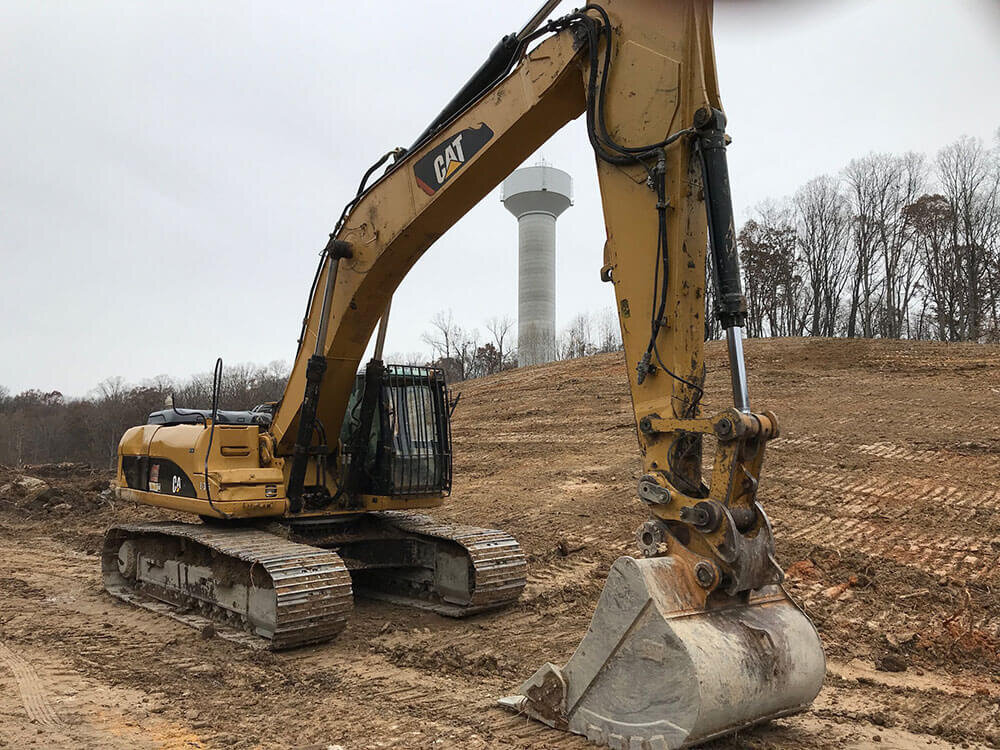The Need for Gradient Restriction on Development in Nashville
A hillside in Bellevue after clearcutting.
Preventing the Dangers of Hillside Clearcutting
One of the biggest problems that accompanies development in urban areas is the indiscriminate removal of trees, or clearcutting, to prepare a site for construction. This practice is especially dangerous when trees are removed on a sloping area, such as the side of a steep hill.
Will Worrall, co-founder and board member of the Nashville Tree Conservation Corps, says the Corps strongly backs legislation to limit clearcutting on Davidson County’s steep slopes. Will and other members of NTCC’s policy committee are working to provide input and support for this much-needed strengthening of the city’s tree codes.
The Nashville Next Community Character Manual, one of Metro’s key planning documents, defines steep slopes as those with an incline greater than 20%. When trees in these areas are removed for construction, the soil becomes structurally unsound, and without tree root systems holding the soil in place, it is more prone to erosion. In worst-case scenarios, landslides can occur, potentially causing personal injury and/or property damage. If a hill with too few trees crumbles onto the street below, it can strike passing cars or other houses. Landslides present a serious danger in steeply sloped areas, and leaving trees in place is the best way to prevent them.
Western Parts of Nashville at Risk
The westernmost third of Davidson County has many hills and slopes, with the majority of this area having inclines of 25% or greater. [See map below.] Thee steep hillsides have been hard for developers to access, but with Nashville’s recent explosion of growth, they are now at risk.
Many other cities in Tennessee already have legal restrictions on the number of trees that can be cleared on such slopes. In Metro Nashville, however, there are currently no laws to stop developers from acquiring land in these hilly, tree-covered corridors and clearcutting the steep slopes. This lack of regulation is a dangerous and inexcusable situation that must be corrected.
Red areas show slopes of greater than 25% in Davidson County.
Hillside and Woodland Protections
The proposed ordinance seeks to accomplish tree preservation goals found in the Metropolitan Nashville Urban Forestry and Landscape Master Plan (2016). Specifically, this ordinance would update the Metro Landscape Code as proposed within Goal #1 of the Plan: “Assess and improve current codes pertaining to development on slopes and the relationship to impacts on trees” and “develop a landscape ordinance that includes tree protection for healthy mature existing trees.”
The ordinance aims to support that goal with five proposals:
Land disturbance and tree removal limited to 10% of acreage in all areas of steep slopes (greater than 20%).
Land disturbance and tree removal limited to 10% of acreage in all areas of slippage soils. Slippage soils are prone to landslides and substantial property damage. Clearcutting of slippage soils has led to slope failures and personal injury in other parts of the state.
Tree canopy retention standards for all zoning districts in Davidson County with slopes less than 20%, excluding agricultural. This would limit the number of trees removed at any site, while allowing reasonable land uses. The ordinance would prioritize tree preservation along important wildlife corridors (such as along streams), in areas of higher quality trees, steeper areas, and in other high value locations on a site.
Relaxed tree canopy retention standards in agricultural zoning districts. Agricultural zoning districts play an important role in maintaining Nashville’s tree canopy; however, flexibility must be maintained to ensure continued reasonable property uses in these zones. Tree removal in agricultural zones would be limited to 25% of trees over a five-year period.
Robust replacement requirements for unauthorized removals. Nashville currently has a $50 fine for unauthorized tree removal, which is rarely imposed. A $50 fine is completely inadequate to ensure compliance. The new ordinance should use a combination of fines, tree replacement requirements and possible imprisonment for violations.
Raise Your Voice to Protect Our Trees
Trees perform many kinds of ecosystem services, all of which are foundational to our quality of life, from processing air and moderating temperatures to maintaining the structural integrity of the ground beneath us. Protecting trees, especially on steep slopes, is important to prevent erosion, which can happen slowly over time, or quickly and dangerously in the form of landslides.
Join the Nashville Tree Conservation Corps in urging the Metro Council to strengthen protections for our hillsides and woodlands. Contact your council member today to voice support for a new ordinance that will prevent clearcutting and protect the health and safety of all Nashville residents.


